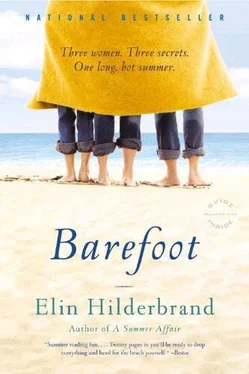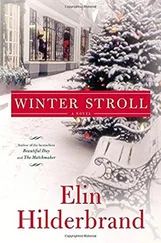Elin Hilderbrand - Barefoot - A Novel
Здесь есть возможность читать онлайн «Elin Hilderbrand - Barefoot - A Novel» весь текст электронной книги совершенно бесплатно (целиком полную версию без сокращений). В некоторых случаях можно слушать аудио, скачать через торрент в формате fb2 и присутствует краткое содержание. Жанр: Старинная литература, на английском языке. Описание произведения, (предисловие) а так же отзывы посетителей доступны на портале библиотеки ЛибКат.
- Название:Barefoot: A Novel
- Автор:
- Жанр:
- Год:неизвестен
- ISBN:нет данных
- Рейтинг книги:4 / 5. Голосов: 1
-
Избранное:Добавить в избранное
- Отзывы:
-
Ваша оценка:
- 80
- 1
- 2
- 3
- 4
- 5
Barefoot: A Novel: краткое содержание, описание и аннотация
Предлагаем к чтению аннотацию, описание, краткое содержание или предисловие (зависит от того, что написал сам автор книги «Barefoot: A Novel»). Если вы не нашли необходимую информацию о книге — напишите в комментариях, мы постараемся отыскать её.
Barefoot: A Novel — читать онлайн бесплатно полную книгу (весь текст) целиком
Ниже представлен текст книги, разбитый по страницам. Система сохранения места последней прочитанной страницы, позволяет с удобством читать онлайн бесплатно книгу «Barefoot: A Novel», без необходимости каждый раз заново искать на чём Вы остановились. Поставьте закладку, и сможете в любой момент перейти на страницу, на которой закончили чтение.
Интервал:
Закладка:
Brenda had taken in this information silently but skeptical y. The last thing she and Vicki needed this summer was a stowaway from a complicated situation. Vicki had lung cancer, and Brenda had problems of her own. Earlier that spring, she had been fired from her teaching job at Champion University for sleeping with her only male student—and, as if that weren’t catastrophic enough, there were “unrelated” criminal charges pending, concerning a valuable piece of university-owned art. Sex scandal! Criminal charges! Brenda had gone from being hot property—a celebrated young professor, the It girl of Champion University—to being the subject of rumor and gossip. Everyone on Champion’s campus had been talking about her: Dr. Brenda Lyndon, who earned top teaching marks in the English Department her very first semester, had conducted an il icit affair with one of her students. And then, for a reason nobody could discern, she had “vandalized” an original Jackson Pol ock—a bequest from a gung-ho alumnus—that hung on the wal of the English Department’s Barrington Room. In addition to the mortifying shame of her relationship with John Walsh, Brenda had been forced to hire a lawyer she couldn’t afford to deal with the vandalism charges. Best-case scenario, Brian Delaney, Esquire, said, would be the university’s art restoration team deciding they could tinker with the painting, fil in the “divot,” make the painting as good as new. Worst-case scenario would be irrevocable damage. The university was stil looking into the matter.
Brenda had ostensibly come to Nantucket because Vicki had cancer and needed help. But Brenda was also unemployed, unemployable, and in serious need of money. Melanie wasn’t the only one who needed “time away” or “time to think”—Brenda needed it, too. Desperately. She had devoted her entire career to one narrow subject: Fleming Trainor’s novel, The Innocent Impostor . This little-known volume, published in 1790, had been the topic of Brenda’s dissertation and of the surprisingly popular seminar she taught at Champion. Since Brenda would be forever ostracized from the world of academia, the only way The Innocent Impostor could make her any money now—at least the kind of money she needed to pay a lawyer and / or a “hefty fine”—was if she used it in some unconventional, and un-academic, way. It was Brian Delaney, Esquire, who suggested Brenda write a screenplay. At first Brenda scoffed, but as Brian Delaney, Esquire, eloquently pointed out: Hollywood loves that old-time shit. Look at Vanity Fair , look at Jane Austen. The Innocent Impostor was so obscure it wasn’t even available on Amazon.com, but Brenda was desperate, not only for money, but for a project, something to work on. She batted the idea around for a while, and the more she thought about it, the less outlandish it seemed. This summer, if anyone asked her what she did for a living, she would tel them she was writing a screenplay.
The other reason that Brenda had come to Nantucket was that John Walsh was in Manhattan, and even in a city of eight mil ion people, Brenda felt his presence as acutely as if he lived on the other side of her exposed-brick wal . She had to sever ties with John Walsh no matter how strongly she felt about him, she had to flee the city of her disgrace, she had to help her sister. A summer on Nantucket was the answer al the way around, and the cottage that had belonged to Brenda and Vicki’s great-aunt Liv was, after three years, out of probate. The two sisters owned it now, official y.
The question wasn’t, why was she here? The question was, why wasn’t she happier she was here?
Brenda held the baby tightly on her lap and put an arm around her four-year-old nephew, Blaine, who was buckled in next to her. The cabbie said,
“Where to?” And Brenda said, “Shel Street, ’Sconset.”
Shell Street, ’Sconset: These were Brenda’s three favorite words in the English language. It had not slipped Brenda’s mind that one way to access a large sum of money was to sel out her half of Aunt Liv’s house to Vicki and Ted. But Brenda couldn’t bear to relinquish the piece of this island she now owned: half of a very smal house. Brenda gazed out the window at the scrubby evergreens that bordered Milestone Road, at the acres of moors held in conservation. She inhaled the air, so rich and clean that it worked like an anesthetic; Blaine’s eyelids started to droop.
Brenda couldn’t help thinking that Walsh would love it here. He was a man of the outdoors, being typical y Australian; he liked beaches and waves, open space, clear sky. He was at a loss in Manhattan, al that manufactured civilization baffled him, the subway suffocated him, he preferred to walk, thank you, mate . How many times had he traversed Central Park in a snowstorm to get to Brenda’s apartment? How many times had they met secretly in Riverside Park after class? Too many, apparently, and not secretly enough. One person had harbored suspicions, the wrong person, and Brenda’s career in academia was over a semester and a half after it began. She had been branded with the scarlet letter despite the fact that Walsh was thirty-one years old and Brenda herself only thirty. The situation at Champion had been such a hideous mess, the cause of such powerful shame, that Brenda had no choice but to end everything with Walsh. He wanted to come visit her here. It would be different, he said, out of the city. Maybe, Brenda thought. But not different enough.
Brenda was relieved that Aunt Liv wasn’t alive to witness her fal from grace. Aunt Liv, a celebrated professor of Russian literature at Bryn Mawr Col ege, had cultivated Brenda for a life in academia. She had served as a mentor and a role model. How many hours had they talked about Fleming Trainor—and Isaak Babel, Tolstoy, Solzhenitzyn, Dumas, Hugo, Whitman? How many times had they agreed there was no nobler pursuit than the study of literature, no better way to spend an evening than alone with Turgenev?
I was doing so well, Brenda thought. Until Walsh.
When Brenda thought of Aunt Liv now, the term “rol ing over in her grave” came to mind. So in some way this summer on Nantucket was about seeking atonement. Brenda wanted others to forgive and, more saliently, forget; she wanted to find some peace for her roiling conscience. Time to think. Time away. Maybe it wouldn’t be so bad, having Melanie around. Misery did love company.
Brenda checked behind her again. Now Vicki’s eyes were closed. She and Melanie were both asleep, and weirder stil , they were holding hands, like they were lovers. Brenda tightened her grip on the warm, doughy baby in her lap. She felt like a six-year-old, jealous and left out.
Victoria Lyndon Stowe had been making lists al her life. She attributed this to the fact that she was the firstborn, a classic type-A personality, something her parents did nothing but reinforce. Vicki is so organized, she never forgets a thing. As early as the fifth grade, Vicki wrote down what she wore to school each day so that she didn’t repeat an outfit. She made lists of her favorite movies and books. She made a list of what each friend gave her for her birthday, and she always wrote the thank-you notes in order so that she could check them off, boom, boom, boom, just like that. At Duke, there had been myriad lists—she was president of the Tri-Delts, the head of the Drama Society, and a campus tour guide, so there were lists for each of those things, and a separate list for her studies. Then, out in the real world, the lists multiplied. There were “single girl living and working in the city” lists, lists for her wedding to Ted Stowe, and final y the endless lists of a mother of young children . Schedule doctor’s appointment; return library books; save milk cartons for planting radishes; money for babysitter; playdate with Carson, Wheeler, Sam; call balloon man for birthday party; buy summer pajamas; oil the tricycle; have carpets cleaned in the playroom .
Читать дальшеИнтервал:
Закладка:
Похожие книги на «Barefoot: A Novel»
Представляем Вашему вниманию похожие книги на «Barefoot: A Novel» списком для выбора. Мы отобрали схожую по названию и смыслу литературу в надежде предоставить читателям больше вариантов отыскать новые, интересные, ещё непрочитанные произведения.
Обсуждение, отзывы о книге «Barefoot: A Novel» и просто собственные мнения читателей. Оставьте ваши комментарии, напишите, что Вы думаете о произведении, его смысле или главных героях. Укажите что конкретно понравилось, а что нет, и почему Вы так считаете.












